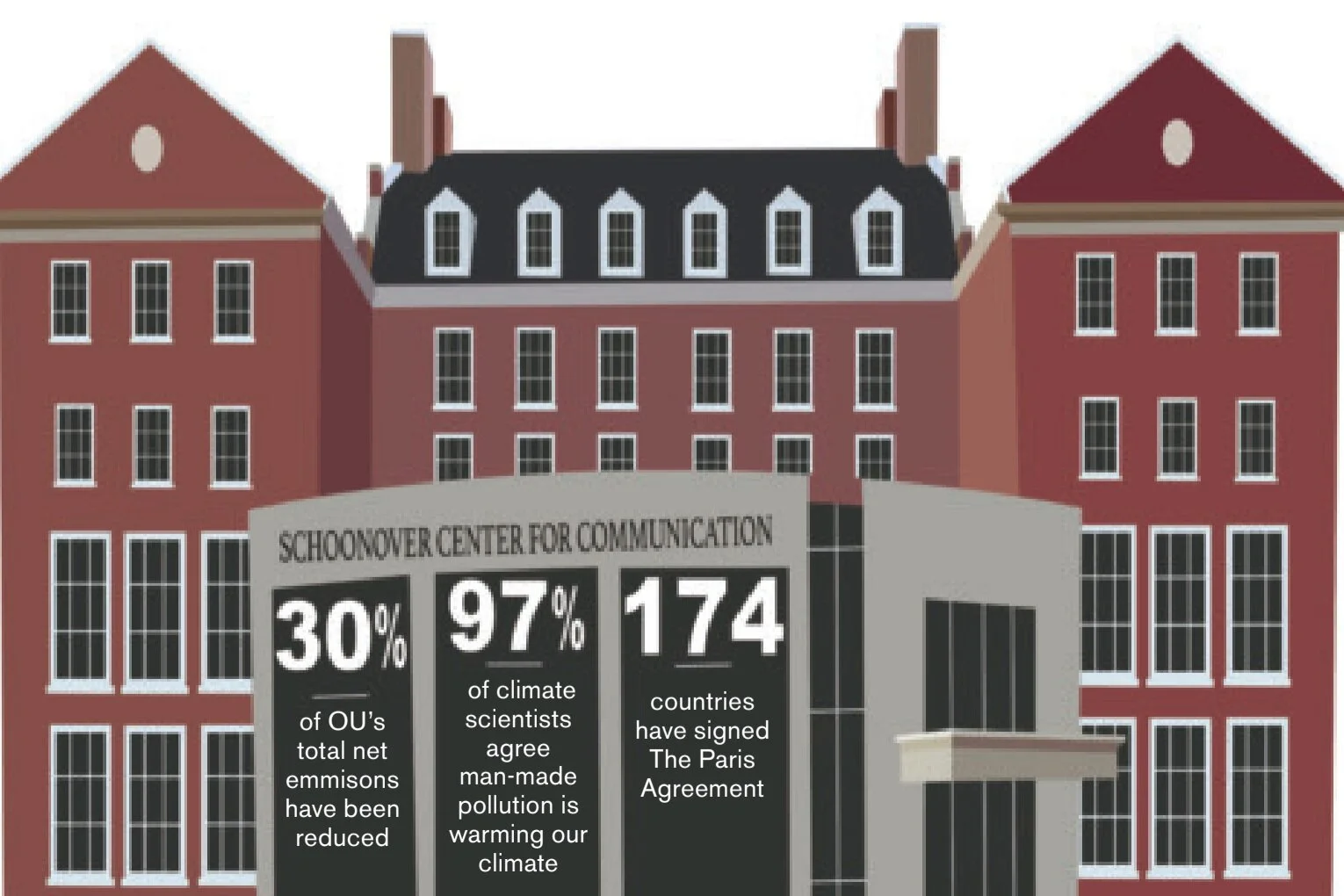Turning Over a New Leaf
Grace Dearing
In just a few months, green vegetation will begin to flourish on the rooftop of Ohio University’s Schoonover Center for Communication.
Kim Thompson, an assistant professor in OU’s Department of Environmental and Plant Biology, has worked closely with the Office of Instructional Innovation, university planner and several colleges across campus to implement OU’s first green roof used for research and education. The goal is to aid in decreasing the negative effects of climate change and increase sustainability awareness in Athens.
“This is not an opinion issue, this is a fact,” Thompson says. “[Climate change is] going to affect everybody and it’s going to affect some people more than others.”
Schoonover’s green roof will reduce greenhouse gases by holding carbon in the form of plant tissues. The vegetation will also slow down rainwater runoff to prevent flooding as well as protect the rooftop, expanding its lifespan and decreasing waste.
illustration by Lainey Douglas
Climate change and the appropriate response to it has been a longstanding debate across the globe.
In 2016, the U.S. and many other countries signed the Paris Agreement, a treaty to collectively strengthen the response to climate change that has now been signed by 174 countries. In response to President Trump’s vow to cease America’s participation in the agreement, the U.S. House of Representatives passed the Climate Action Now Act, designed to keep the U.S. in the Paris Agreement.
Jessica Dalzell, a member of the Athens Environment and Sustainability Commission, says national strides mean nothing if the desire to live sustainably is not also encouraged within small communities.
“Affecting climate change is definitely important from a grassroots level,” Dalzell says. “Getting groups of people, wherever they live, to acknowledge that it’s an issue and start making changes in their daily lives is when people start becoming aware of climate change.”
In 2005, OU hired the first sustainability staff member. Two years later, then-President Roderick McDavis signed the American College & University Presidents’ Climate Commitment (ACUPCC). OU was the first university in Ohio to sign the ACUPCC, committing to implement institutional initiatives and follow specific reporting guidelines.
Since 2012, OU’s net emissions decreased by 30 percent and direct emissions and emissions from purchased electricity have decreased by 50 percent, as reported by the Office of Sustainability. In comparison to other universities, OU is significantly ahead in terms of campus sustainability engagement, says Elaine Goetz, the director of the Office of Sustainability.
It’s important, Dalzell notes, to recognize that sustainability is a multi-dimensional topic which includes three pillars: finance, environment and quality of life. In order to truly achieve sustainable living, community members must have equal access to a successful life that is financially doable for the future and ensures the planet is able to continue running, as it is now, for future generations.
“We’re always trying to push forward. It’s really critical that we have participation from the students, in particular,” Goetz says. “A lot of people don’t even understand that sustainability is a triple bottom line concept, it’s not just about the environment.”
For example, if someone chooses to ride a bike to class rather than driving, they are nurturing a sustainable lifestyle from all three aspects. The physical exercise of riding a bike promotes their quality of life, cuts down on financial costs of gas and reduces the carbon emissions put out into the environment.
Five years ago, OU’s campus joined the push for decreasing landfill waste by co-locating recycling bins with trash bins, says Goetz. The campus also worked with the Athens-Hocking Recycling Center (AHRC) to single-stream waste and eliminate the need for individuals to separate their recycling, thus making the concept of recycling even easier.
The city of Athens joined the effort by creating a pilot program that allowed for compost materials to be picked up curbside, like any regular trash bin. The AHRC then turns those materials (food scraps, napkins, etc.) into soil.
Dalzell believes that that is one of the simplest lifestyle changes someone can make to improve sustainability. “You’re already making an effort to throw all that stuff away, so it’s not really much more energy to put out,” she says.
Additionally, four Athens city buildings have pledged to work toward zero waste. The goal is to decrease the amount of waste going to landfills by increasing awareness of recycling bins within those buildings.
A national open letter titled “We Are Still In” recognizes the impact that small communities can have on climate change and calls upon leaders at all levels to support the Paris Agreement. OU President Duane Nellis signed the letter in June 2017.
“Any time people see the community taking action, that is just going to help us in the future,” Thompson says. “Those little steps will make a difference in people’s commitment.”
Students have the opportunity to get involved with Thompson’s green roof and the Climate and Sustainability Ambassadors Program. Ambassadors will work both on campus and in the community to advocate for the Office of Sustainability.
But, Dalzell says, it’s even easier than that for students to contribute to the sustainability efforts in Athens. Simple changes like switching to LED light bulbs or shopping for secondhand clothes or using reusable bags can have a big impact.
Though OU’s campus and the Athens community have made great strides within recent years to reduce its negative effects on climate change, Thompson, Dalzell and Goetz all agree that there is always progress to be made.
“Eventually, our living habits and our shopping habits [will] start to change when we start to consciously make an effort to be more sustainable and more environmentally friendly,” Dalzell says. “[In turn], that reduces our effect on climate change.”
*A change has been made from the print version prior to publishing online.

